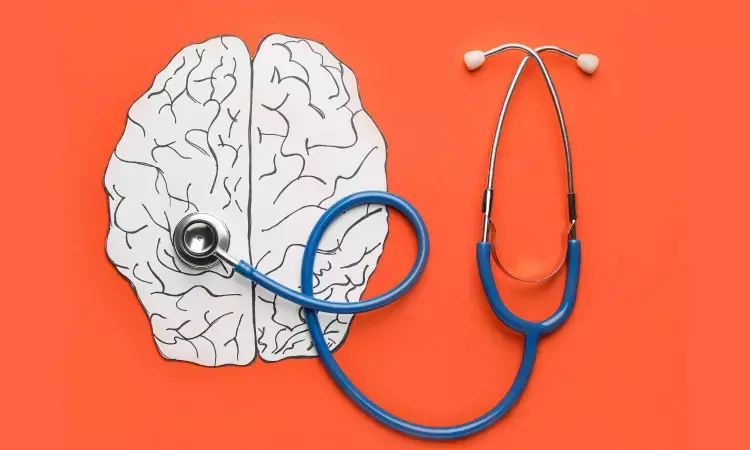- Home
- Medical news & Guidelines
- Anesthesiology
- Cardiology and CTVS
- Critical Care
- Dentistry
- Dermatology
- Diabetes and Endocrinology
- ENT
- Gastroenterology
- Medicine
- Nephrology
- Neurology
- Obstretics-Gynaecology
- Oncology
- Ophthalmology
- Orthopaedics
- Pediatrics-Neonatology
- Psychiatry
- Pulmonology
- Radiology
- Surgery
- Urology
- Laboratory Medicine
- Diet
- Nursing
- Paramedical
- Physiotherapy
- Health news
- Fact Check
- Bone Health Fact Check
- Brain Health Fact Check
- Cancer Related Fact Check
- Child Care Fact Check
- Dental and oral health fact check
- Diabetes and metabolic health fact check
- Diet and Nutrition Fact Check
- Eye and ENT Care Fact Check
- Fitness fact check
- Gut health fact check
- Heart health fact check
- Kidney health fact check
- Medical education fact check
- Men's health fact check
- Respiratory fact check
- Skin and hair care fact check
- Vaccine and Immunization fact check
- Women's health fact check
- AYUSH
- State News
- Andaman and Nicobar Islands
- Andhra Pradesh
- Arunachal Pradesh
- Assam
- Bihar
- Chandigarh
- Chattisgarh
- Dadra and Nagar Haveli
- Daman and Diu
- Delhi
- Goa
- Gujarat
- Haryana
- Himachal Pradesh
- Jammu & Kashmir
- Jharkhand
- Karnataka
- Kerala
- Ladakh
- Lakshadweep
- Madhya Pradesh
- Maharashtra
- Manipur
- Meghalaya
- Mizoram
- Nagaland
- Odisha
- Puducherry
- Punjab
- Rajasthan
- Sikkim
- Tamil Nadu
- Telangana
- Tripura
- Uttar Pradesh
- Uttrakhand
- West Bengal
- Medical Education
- Industry
Brain Health affected the most after COVID-19, JAMA study

Covid-19 took a toll on health not only physically but also mentally. The quarantine, the separation from family, friends and social life has an untold story on the mental health. Brain health is most likely compromised after hospitalization for COVID-19; however, long-term prospective investigations with matched control cohorts and face-to-face assessments are lacking.
A new study in JAMA Network suggests patients hospitalized for COVID-19 performed worse than healthy controls on cognitive, psychiatric, and neurological tests. However, compared with hospitalized controls matched for age, sex, and severity of disease, the impairment of brain health was similar.
To assess whether long-term cognitive, psychiatric, or neurological complications among patients hospitalized for COVID-19 differ from those among patients hospitalized for other medical conditions of similar severity and from healthy controls. Researchers conducted a prospective cohort study with matched controls was conducted at 2 academic hospitals in Copenhagen, Denmark. The case cohort comprised patients with COVID-19 hospitalized between March 1, 2020, and March 31, 2021. Control cohorts consisted of patients hospitalized for pneumonia, myocardial infarction, or non–COVID-19 intensive care–requiring illness between March 1, 2020, and June 30, 2021, and healthy age- and sex-matched individuals. The follow-up period was 18 months; participants were evaluated between November 1, 2021, and February 28, 2023.
The primary outcome was overall cognition, assessed by the Screen for Cognitive Impairment in Psychiatry (SCIP) and the Montreal Cognitive Assessment (MoCA). Secondary outcomes were executive function, anxiety, depressive symptoms, and neurological deficits.
The key findings of the study are
- The study included 345 participants, including 120 patients with COVID-19 (mean [SD] age, 60.8 [14.4] years; 70 men [58.3%]), 125 hospitalized controls (mean [SD] age, 66.0 [12.0] years; 73 men [58.4%]), and 100 healthy controls (mean [SD] age, 62.9 [15.3] years; 46 men [46.0%]).
- Patients with COVID-19 had worse cognitive status than healthy controls (estimated mean SCIP score, 59.0 [95% CI, 56.9-61.2] vs 68.8 [95% CI, 66.2-71.5]; estimated mean MoCA score, 26.5 [95% CI, 26.0-27.0] vs 28.2 [95% CI, 27.8-28.6]), but not hospitalized controls (mean SCIP score, 61.6 [95% CI, 59.1-64.1]; mean MoCA score, 27.2 [95% CI, 26.8-27.7]).
- Patients with COVID-19 also performed worse than healthy controls during all other psychiatric and neurological assessments. However, except for executive dysfunction (Trail Making Test Part B; relative mean difference, 1.15 [95% CI, 1.01-1.31]), the brain health of patients with COVID-19 was not more impaired than among hospitalized control patients. These results remained consistent across various sensitivity analyses.
Researchers concluded that "This prospective cohort study suggests that post–COVID-19 brain health was impaired but, overall, no more than the brain health of patients from 3 non–COVID-19 cohorts of comparable disease severity. Long-term associations with brain health might not be specific to COVID-19 but associated with overall illness severity and hospitalization. This information is important for putting understandable concerns about brain health after COVID-19 into perspective."
Reference: Peinkhofer C, Zarifkar P, Christensen RHB, et al. Brain Health After COVID-19, Pneumonia, Myocardial Infarction, or Critical Illness. JAMA Netw Open. 2023;6(12):e2349659. doi:10.1001/jamanetworkopen.2023.496
MSc. Neuroscience
Niveditha Subramani a MSc. Neuroscience (Faculty of Medicine) graduate from University of Madras, Chennai. Ambitious in Neuro research having worked in motor diseases and neuron apoptosis is interested in more of new upcoming research and their advancement in field of medicine. She has an engrossed skill towards writing and her roles at Medical dialogue include Sr. Content writer. Her news covers new discoveries and updates in field of medicine. She can be reached at editorial@medicaldialogues.in
Dr Kamal Kant Kohli-MBBS, DTCD- a chest specialist with more than 30 years of practice and a flair for writing clinical articles, Dr Kamal Kant Kohli joined Medical Dialogues as a Chief Editor of Medical News. Besides writing articles, as an editor, he proofreads and verifies all the medical content published on Medical Dialogues including those coming from journals, studies,medical conferences,guidelines etc. Email: drkohli@medicaldialogues.in. Contact no. 011-43720751


